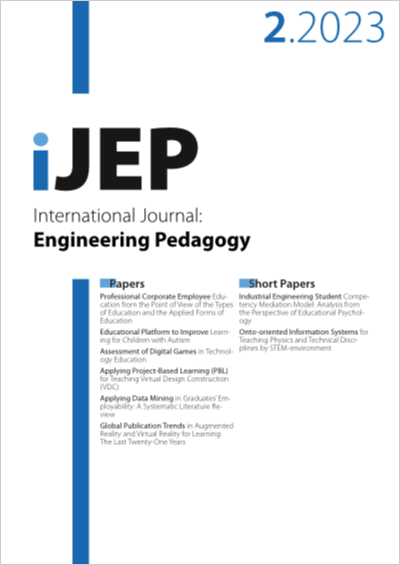Applying Data Mining in Graduates’ Employability
A Systematic Literature Review
DOI:
https://doi.org/10.3991/ijep.v13i2.33643Keywords:
data mining, employability, machine learning, predictive analysis, prescriptive analysis, graduate skills, lack of contextual factorsAbstract
Envisaging an adequate IT/IS solution that can mitigate the employability problems is imperative because nowadays there is a high rate of unemployed graduates. Thus, the main goal of this systematic literature review (SLR) was to explore the application of data mining techniques in modeling employability and see how those techniques have been applied and which factors/variables have been retained to be the most predictors or/and prescribers of employability. Data mining techniques have shown the ability to serve as decision support tools in predicting and even prescribing employability.
The review determined and analyzed the machine learning algorithms used in data mining to either predict or prescribe employability. This review used the PRISMA method to determine which studies from the existing literature to include as items for this SLR. Hence, 20 relevant studies, 16 of which are predicting employability and 4 of which are prescribing employability. These studies were selected from reliable databases: ScienceDirect, Springer, Wiley, IEEE Xplore, and Taylor and Francis. According to the results of this study, various data mining techniques can be used to predict and/or to prescribe employability. Furthermore, the variables/factors that predict and prescribe employability vary by country and the type of prediction or prescription conducted research. Nevertheless, all previous studies have relied more on skill as the main factor that predict and/or prescribe employability in developed countries and none studies have been conducted in unstable developing countries. Therefore, the need to conduct research on predicting or prescribing employability in such countries by trying to use contextual factors beyond skill as features.
Downloads
Published
How to Cite
Issue
Section
License
Copyright (c) 2023 Héritier Nsenge Mpia, Dr. Lucy Waruguru Mburu, Dr. Simon Nyaga Mwendia

This work is licensed under a Creative Commons Attribution 4.0 International License.



